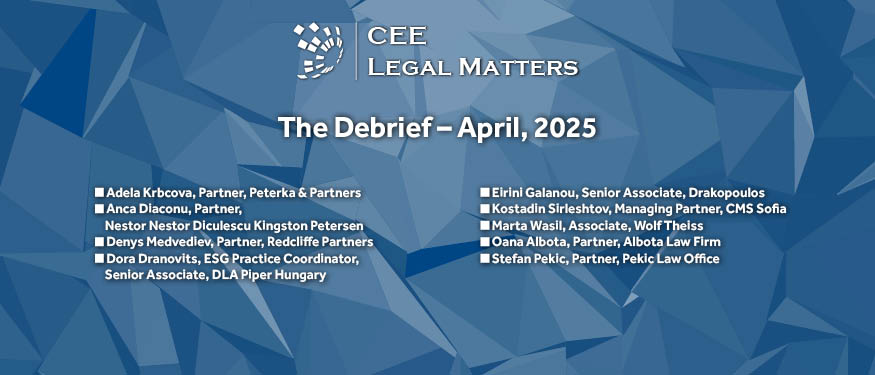In The Debrief, our Practice Leaders across CEE share updates on recent and upcoming legislation, consider the impact of recent court decisions, showcase landmark projects, and keep our readers apprised of the latest developments impacting their respective practice areas.
This House – Reached an Accord
Peterka & Partners Partner Adela Krbcova draws attention to a new amendment to Czech labor law. “A new amendment to the Czech Labor Code, approved by the National Assembly on March 7, was quickly passed by the Senate on April 14. It is awaiting the President’s signature and, if published in the Collection of Laws in April, it will enter into force on June 1,” Krbcova notes. “Only the parts of the bill that amend the Employment Act and redesign the unemployment and requalification allowances will come into force as of January 1, 2026. There has been a great deal of discussion about the changes to employment terminations, especially unilateral dismissals, and those that will give parents more flexibility and security, but also deserving of attention are the changes that reduce the administrative burden on employers.”
Krbcova points to a shift in salary payment practices, highlighting that priority will be given to cashless salary payments. “The category of employees that can be paid in a currency other than CZK will be expanded,” she adds. “A long-awaited change is that the entry medical checks for new employees will be optional for non-risk category work.”
Drakopoulos Senior Associate Eirini Galanou outlines a recent legislative development concerning corporate governance and gender representation in Greece. Recently, “Law 5178/2025, which transposes into Greek law, inter alia, EU Directive 2022/2381 on improving the gender balance among directors of listed companies (Law 5178), was published,” she reports, adding that the law “aims to achieve a more balanced representation of women and men among the directors of companies.” In particular, a key initiative is “the adoption of numerical thresholds for gender representation on the board of directors of listed companies, which are now required to ensure that at least 25% of the underrepresented gender is represented on their boards.”
According to Galanou, “for listed companies that meet specific size criteria (i.e., employing at least 250 employees and having either an annual turnover of at least EUR 50 million or an annual balance sheet of at least EUR 43 million), the law provides for an increased threshold of 33%.” In addition, Galanou says, the law has also introduced “an obligation for listed companies that fall within the scope of the increased threshold to publish a special annual report aimed at enhancing transparency.” The report, according to her, must also be published on the company’s website and submitted to the Hellenic Capital Market Commission, the Greek Ombudsman, and the Ministry of Social Cohesion and Family Affairs by September 30 each year.
As for unlisted companies “operating as societes anonymes, Law 5178 provides that they may also be subject to the increased quota of 33% for the representation of the under-represented gender on their board of directors, as well as the proportions of executive members, provided that they meet the above-mentioned size criteria,” Galanou notes. “However, adherence to this provision is voluntary for non-listed companies, and an amendment to their articles of association is required. The executive proportion rule may also be applied voluntarily to non-listed public companies that meet the same size criteria, provided that their articles of association include such a provision.”
This House – The Latest Draft
Wolf Theiss Associate Marta Wasil highlights pay transparency reform in Poland. “On April 3, 2025, the Parliament of the Republic of Poland published a draft act amending the Labor Code, representing a significant step towards the implementation of EU Directive 2023/970 on pay transparency,” she notes. “The directive, which must be transposed by EU Member States by June 7, 2026, aims to strengthen the principle of equal pay for equal work and to enhance pay transparency across Member States.”
Wasil adds that the draft requires that “remuneration, including all financial and non-financial components, be disclosed not only during the course of employment but also at the recruitment stage. This approach marks a significant departure from the current practice in Poland, where remuneration data is typically treated as confidential business information.” In its current form, she says, “the draft act provides for the introduction of an obligation on employers to inform job candidates of the applicable remuneration or remuneration range based on objective, gender-neutral criteria, as well as relevant provisions of collective labor agreements or internal remuneration regulations, where applicable.”
“Such information must be provided in writing or in electronic form, in job advertisements, prior to job interviews, or before the employment relationship is established, thereby ensuring transparent and informed negotiations,” Wasil adds. “Furthermore, the draft act also introduces changes regarding the scope of personal data that may be requested from job applicants. Specifically, it excludes the possibility of obtaining information about remuneration in current and previous employment relationships.” If adopted, she points out that the amendment “will enter into force six months after its publication in the Journal of Laws.”
As for Hungary, DLA Piper Hungary ESG Practice Coordinator Dora Dranovits highlights a new draft on ESG. “A bit overshadowed by the Omnibus package, a proposal was published late March regarding the amendment of the Hungarian ESG Act,” she notes. “Originally proposed by the Hungarian Chamber of Commerce, the amendments are mainly aimed at – you guessed it – decreasing the administrative burdens of Hungarian companies, especially SMEs. Under the new rules, if adopted, general applicability rules will be amended as well, and no reporting obligations will be applicable to SMEs, including participation in their clients’ due diligence processes. The ESG reports of in-scope companies will not be obliged to submit their ESG reports to the authority for the years 2024-2026. The proposal is not yet officially submitted to the Hungarian parliament, but if it is adopted, all Hungarian companies are advised to carry out or update their applicability assessments to be in line with the (seemingly) ever-changing ESG reporting obligations.”
The Verdict
Redcliffe Partners Partner Denys Medvediev reports that a Ukrainian court set a precedent recently by overturning the merger clearance for CRH’s acquisition of cement assets. “In a landmark ruling with significant consequences for Ukraine’s competition enforcement framework, a Ukrainian court annulled the Antimonopoly Committee of Ukraine’s (AMCU) approval of CRH Ukraine’s acquisition of shares in Dickerhoff Cement Ukraine,” Medvediev notes, adding that “this rare judicial reversal could substantially impact how Phase II merger reviews are conducted and challenged in the country.”
According to Medvediev, the case was brought by Kovalska Group, which contested the AMCU’s approval of the acquisition. “Kovalska argued that the AMCU’s analysis lacked sufficient consideration of the transaction’s potential impact, particularly in the downstream ready-mix concrete market, and failed to meet procedural requirements during the merger review process,” he reports. “While the AMCU imposed behavioral remedies on CRH, including restrictions on cement production and sales to mitigate anticompetitive risks, the court found these commitments were not adequately enforced. It concluded that the AMCU had not convincingly demonstrated that the acquisition would not harm competition or lead to monopolistic practices, rendering the merger clearance invalid.”
Medvediev believes that “this case could mark a turning point for Ukrainian competition law. It confirms the judiciary’s willingness to review substantive merger assessments, not just procedural compliance, reinforcing judicial oversight over regulatory discretion. The ruling also highlights the legal risks companies face if commitments made during merger reviews are not strictly observed, including the potential for ex post annulment of clearance.” He further adds that the ruling is likely “to prompt increased caution among both domestic and international investors in Ukraine, especially in sectors undergoing consolidation or post-war reconstruction. It may also encourage competitors to seek judicial redress if they believe the AMCU has failed to adequately protect market integrity.”
Albota Law Firm Partner Oana Albota highlights a recent court decision in Romania that settles the issue of building permits following the annulment of zonal urban plans. “On April 9, 2025, the Constitutional Court of Romania (CCR) published a press release with significant implications for urban planning practice and real estate development in Romania.” The CCR, according to Albota, held that “the previous interpretation, according to which the annulment of a normative administrative act, such as a Zonal Urban Plan (PUZ), automatically affects the individual administrative acts issued on its basis, is unconstitutional. More precisely, the CCR found that such a practice undermines the legal certainty of the beneficiaries of building permits lawfully issued based on urban planning regulations that were valid at the time of issuance” (see more on page 46).
In the Works
On the renewable energy front in Bulgaria, according to CMS Sofia Managing Partner Kostadin Sirleshtov, “Bulgaria saw the licensing of several new photovoltaic projects of local investors, such as Solar Park Trakiya and Geosolar Kamenyak, and the putting into operation of the first new photovoltaic project of Chint/Astronergy in Bulgaria – Boychinovci.”
Done Deals
But the biggest news in Bulgaria over the past few weeks, according to Sirleshtov, was related to the oil & gas sector. “A contract for the exploration and extraction of oil and natural gas in Block 1-26 Khan Tervel, located within Bulgaria’s exclusive economic zone in the Black Sea, was signed on April 15, 2025, between Bulgaria and Shell. The agreement marks a significant move toward bolstering the country’s energy independence, one of the Bulgarian government’s key priorities.” Furthermore, Sirleshtov reports that on April 12, 2025, OMV Petrom closed a farm-out transaction with NewMed Energy in the Black Sea offshore Bulgaria for the Han Asparuh exploration block. A total of 4,000 pipes were transported to Bulgaria for the construction of the first new gas pipeline – Vertical Gas Corridor – in April. The Vertical Gas Corridor is a crucial project not just for Bulgaria but for Central and Southeastern Europe. Bulgaria aims to be the first country to initiate the actual expansion of its gas transmission system. The first step is the delivery of pipes for the project.”
In the field of M&A and private equity in Serbia, Pekic Law Office Partner Stefan Pekic says that “March closed with two significant developments that signal ongoing consolidation and growth in both the financial and consumer sectors.” According to Pekic, “both deals highlight increased investor appetite, particularly for well-positioned local players with regional ambitions.”
“First, on March 31, AIK Banka officially completed the integration of Eurobank Direktna, following its 2023 acquisition,” Pekic reports. “The newly unified entity now operates as Aik Banka a.d. Beograd, positioning itself as the third largest bank in Serbia, with assets totaling EUR 6.4 billion and over 150 branches. This transaction, valued at approximately EUR 280 million, adds to AIK’s prior acquisitions of Alpha Bank and Sberbank, reinforcing a strategic pattern of regional expansion.” From a legal perspective, he adds that “the deal stands out for its cross-border complexity, involvement of multiple regulatory bodies, and its broader implications for the structure and competitiveness of the financial services market in Southeast Europe.”
In the private equity space, “BlackPeak Capital made its first investment in Serbia, acquiring a stake in Kafeterija, the country’s leading specialty coffee chain,” Pekic continues. “Founded in 2014, Kafeterija has grown to 53 locations across Serbia and Montenegro, and this investment is aimed at fueling its regional expansion into Bulgaria, Romania, and Hungary. The transaction reflects a growing interest of private equity funds in scalable consumer-facing businesses from Southeast Europe, and is a landmark moment for the Serbian startup and hospitality ecosystem.”
Regulators Weigh In
The major update in Romania’s competition landscape, according to Nestor Nestor Diculescu Kingston Petersen Partner Anca Diaconu, is the developments regarding the Vodafone-Telekom deal. “Romania’s Competition Council (RCC) has voiced concerns over two proposed telecom transactions that could reshape the mobile communications market. The deals, through which Vodafone Romania S.A. seeks to acquire Telekom Romania Mobile Communications S.A., while Digi Romania S.A. would take over certain assets of the same company, have triggered eight specific objections from the regulator,” she reports. “The RCC now expects the parties to submit commitment proposals designed to eliminate the identified competition risks raised by the deal, which was first announced on October 31, 2024.”
Among the regulator’s concerns, Diaconu says, “is the potential for a decline in service quality, particularly in the form of reduced average mobile data download speeds that would materially undermine the user experience. At the same time, the authority questions whether the spectrum resources that would be consolidated in the hands of the acquiring companies will be fully utilized.” Diaconu adds that “the competitive impact on other market participants also features prominently in the regulator’s analysis. Orange Romania S.A., currently reliant on Telekom’s mobile infrastructure for colocation services, may see its access restricted under the new ownership structure. Moreover, the terms under which Telekom provides hosting services to Veridian Systems SRL could be adversely affected, potentially disrupting long-standing commercial arrangements.”
“More structurally, the regulator is concerned about the future of the wholesale market for mobile access and call origination services,” Diaconu notes. “Telekom’s departure as a supplier in this segment risks eliminating an essential source of access for mobile virtual network operators, and the regulator has expressed doubts that Digi would be in a position to offer a comparable alternative.”
According to Diaconu, “as the review progresses, much will depend on whether Vodafone and Digi can offer compelling remedies to address the regulator’s objections. Against a backdrop of intensifying scrutiny of telecom mergers across Europe, the Romanian authority’s position sends a clear signal – scale must not come at the expense of competition.”
This article was originally published in Issue 12.3 of the CEE Legal Matters Magazine. If you would like to receive a hard copy of the magazine, you can subscribe here.
















